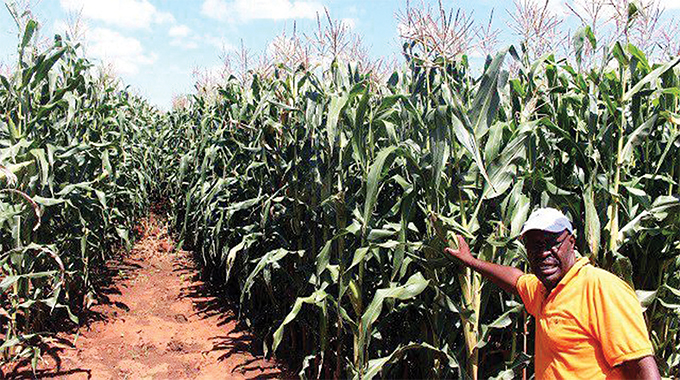Maize harvest to drop 54 percent

A farmer inspects his maturing maize crop in this file photo
The Chronicle
Elita Chikwati, Harare Bureau
The country is expecting 776 635 tonnes of maize from the 2018/2019 summer cropping season due to a poor rainfall season characterised by long dry spells, the second round crop and livestock assessment report reveals.
The output represents a 54 percent decline compared to the 2017/2018 cropping season, which yielded 1 700 702 tonnes.
According to the report, 1 623 757 hectares were put under maize last season.
The report also notes that the 2018/2019 season was characterised by a late on-set of rains across the country.
“The false-starts in the southern and south-eastern parts of the country affected the crop establishment,” reads the report in part.
“Long dry spells in January and February negatively affected the planted crop. Cyclone Idai, which hit the country in mid-February, caused severe damage to crops and agriculture infrastructure in Manicaland and Masvingo provinces.
“However, it improved crop condition in Mashonaland East and Central.”
Mashonaland West is leading in maize production with 228 073 tonnes while Mashonaland Central is second with 159 184 tonnes, with Mashonaland East at third place with 153 831 tonnes.
Midlands is expected to harvest 93 703 tonnes while Masvingo will get 60 962, Matabeleland South 16 781 tonnes and Matabeleland North 13 031 tonnes.
The reports shows that Mashonaland West and Central provinces have substantial surplus cereal production while Masvingo and the Matabeleland provinces have a deficit
“Out of the 60 percent administrative rural districts in the country, 11 (18 percent) have enough cereal to last until the next harvest and the rest (49 districts) will last between two and 11 months,” reads the report.
Sorghum production is expected to be 40 215 tonnes, finger millet (6 947 tonnes) and pearl millet 28 047 tonnes.
The combined small grains production decreased by 44 percent compared to 2017/2018.
According to the report, several dry spells experienced this year affected the regions where significant areas are put under small grains.
Groundnuts production declined by 44 percent from 127 202 tonnes in the 2017/18 season to 70 902 tonnes this season.
Production of pulses and tubers remain low.
Sugarbean production also decreased by 55 percent from 21 320 tonnes to 9 528 tonnes while cowpeas decreased by 23 percent to 12 655 tonnes while sweet potatoes declined 73 percent to 88 248 tonnes.
The huge decrease in the production of tubers and legumes is a result of erratic rains at the start of the season and long dry spells in January when the crops are normally planted.
Climate change is affecting rainfall patterns.
Government is committed to transforming agricultural systems to reduce the vulnerability of smallholder farming communities to food and nutrition insecurity, climate change effects and economic shocks, and ensure the sector fully contributes to the aspirations of Vision 2030 of an Upper Middle Income economy.
In this regard, investments in mechanised farming have been increased.
Further, the rehabilitation of irrigation systems, and procurement of new systems, in on course.
Once fully equipped, farmers will be able to produce winter crops such as wheat.
Government is also in the process of improving communities’ access to water through the construction of weirs, repairing of small dams, de-silting of communal dams and drilling of boreholes.
The weirs and small dams will allow for the storage of water during summer for use during the dry season.
The water will be used for irrigating fields, dip tanks, drinking by livestock and meeting other communal water requirements.
